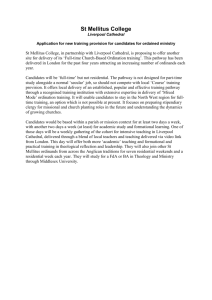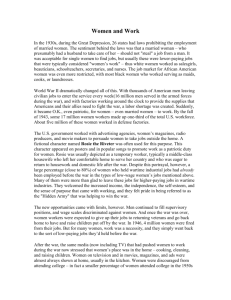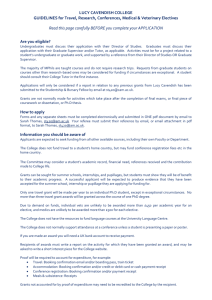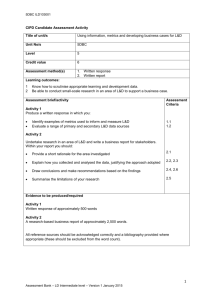Support for married candidates
advertisement
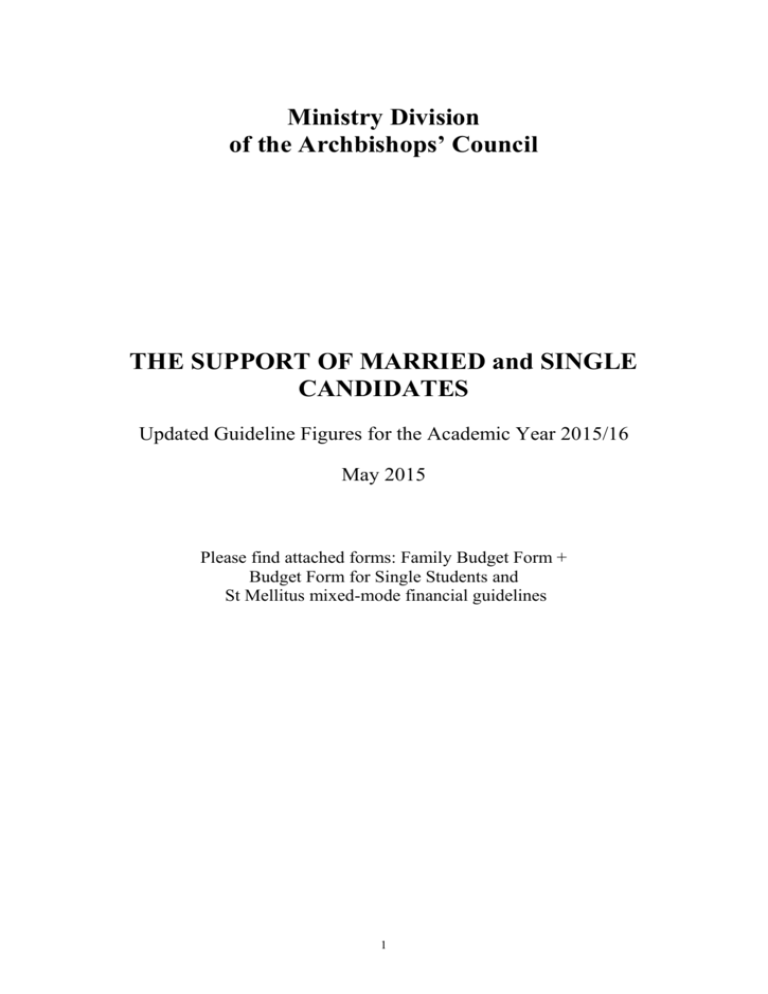
Ministry Division of the Archbishops’ Council THE SUPPORT OF MARRIED and SINGLE CANDIDATES Updated Guideline Figures for the Academic Year 2015/16 May 2015 Please find attached forms: Family Budget Form + Budget Form for Single Students and St Mellitus mixed-mode financial guidelines 1 Contents Introduction – guidelines summary 1. Recommended guideline figures for expenditure 2. Deacon’s net income 3. Sample family budget 4. Allowances from Central Church Funds 5. Family Maintenance Grants from the Church Times TAP Fund (and equivalent grants) 6. Rented accommodation (average costs) 7. State benefits 8. Partner’s income 9. Income from charities and donations 10. Life Assurance Scheme for married candidates 11. Support of lone parents 12. College accommodation charges for single students during vacations 13. College term dates 14. Funding arrangements for Colleges re tuition and maintenance costs 15. Comparison of training costs 2 Introduction The updated guideline figures for the 2015/16 academic year are set out in the following pages. The increase in the basic guideline figures for expenditure (Section 1) represents a small inflationary increase of 1.5% from the current year. A further section (15) has been added to the present updated document, which sets out a comparison of the costs of different types of training. This will be of use to dioceses, particularly in the light of the Reform and Renewal programme and the proposals of the Resourcing Ministerial Education review. Following the change two years ago, the payment of Ministry Division grants to ordinands training at Colleges will continue to be through the training institutions – the Colleges retaining the maintenance fees element whilst passing on to the student any personal grant. The payment of book and travel grants to Regional Course students and the grants to mixedmode students will continue, as now, direct to ordinands by BACS. Tuition costs will be met by the Ministry Division direct to the training institutions. The block grant system has now been completely phased out and tuition costs paid on a fee per student basis. There are two standard College maintenance rates: a residential rate (£5,151 in 2015/16) and a non-residential rate (£3,111 pa in 2015/16). Section 14 gives further information about what is expected to be covered by the maintenance charge. Dioceses are reminded that the General Synod agreed in 2011 to “limit the pooling of maintenance costs for candidates to those candidates who can be ordained by the time they are 50 years of age having completed their normal training”. The new policy came into effect in September, 2012. Candidates above this age limit may still train at college and continue to be eligible for the training grants from Central Church Funds; any diocesan maintenance for ordinands in this category may, however, not be included in the pooling arrangement. Any enquiries about the guidelines should be addressed to Mark Hodge, Grants Officer, Ministry Division, Church House, Great Smith Street, London SW1P 3AZ (telephone 020 7898-1396 or e-mail: mark.hodge@churchofengland.org) 3 GUIDELINES ON THE SUPPORT OF MARRIED CANDIDATES – SUMMARY The guidelines were first introduced in 1988 through the Report of the Working Group on the Support of Married Candidates. The pooling of diocesan expenditure on married candidates was introduced in 1990; extended to include diocesan expenditure on single candidates in 1998. The guidelines are based on the use of a budget form showing estimated family income and expenditure. The diocese is then expected to make a family maintenance grant which bridges the shortfall between income and expenditure. BUDGETED EXPENDITURE Section 1 sets out the recommended guideline figures, which represent reasonable standard expenditure for a married candidate and family. If Child Benefit will be taken into account in the income side of the budget, the expenditure figures in the second column should be used. Accommodation costs will consist of rent or mortgage costs. Information (from the Colleges) about the level of rents of College-owned property and in the private sector is set out in Section 6. Accommodation costs (within the pooling arrangement) should not exceed the recommended limits given in Section 1. Council Tax should be included in the budget as a separate item from accommodation costs. Please note the reductions in Council Tax available to students. Removal costs to College are met by the diocese, in addition to the first year’s annual budget. The Life Assurance Scheme for married candidates is described in Section 10. If a married candidate wishes to opt out of this scheme in order to continue a current policy, the premium may be included up to £85 pa (in 2015/16). For reference, Section 2 shows the current relation between the level of married candidates’ support and a curate’s net remuneration. Section 3 gives a sample family budget showing typical family expenditure within the guidelines, divided between essential and desirable items. In the case of a married candidate whose family does not move to College, travel costs over and above the level of any Ministry Division travel allowance should be included in the expenditure side of the budget. BUDGETED INCOME The income side of the budget should include the grants made to candidates from the Central Fund for Ministerial Training (Personal Allowance, Short Vacation Allowance, Long Vacation Allowance) and TAP grant. (Dioceses are asked to disregard any grants made from the TAP Special Hardship Fund). College rebates will generally no longer be available to married students. Where made in individual cases the student will need to inform the diocese. The rebate should be taken into account as income in the budget. Spouse’s income is included in the budget following the guidelines given in Section 8. Income from charities and trusts is included subject to the disregard described in Section 9. 4 Section 7 gives details of the State Benefits for which ordinands may be eligible. Special attention should be given to application for Child Tax Credit and Working Tax Credit. The Finance Panel now recommends that CTC and WTC should be subject to a disregard separate from the disregard applied to spouse’s income. Dioceses may disregard £1,208 pa of any income from employment during the vacations. Please note that College maintenance fees should not be entered as income in the budget. LONE PARENTS Details of the assessment of grants to lone parents are set out in Section 11. UNMARRIED CANDIDATES A separate budget form is provided for use with single candidates in College training. The form takes account of the position of a single student, who is generally resident in College during term-time and the board and lodging costs during term-time covered by the College maintenance fees. Section 12 sets out the information provided by the Colleges on levels of accommodation charges for single students who remain in College during the vacations. Section 13 gives each College’s term dates and the varying dates and lengths of College vacations. POOLING ARRANGEMENT From September, 2013 the pooling arrangement has not included diocesan expenditure in relation to the maintenance of candidates who will not be ordained “by the time they are 50 years of age having completed their normal training” (see note on p 3). The pooling of diocesan expenditure on the support of married candidates was introduced, following General Synod’s approval, in 1990. In 1998 the arrangement was extended to include diocesan expenditure on single students, subject to a limit (currently £1,525 per head per annum). The pooling system was subjected to a further change in 2010/11 – shifting from a system based on the calendar year to one based on academic years. The way in which this now works is that, in the Spring of each year, dioceses are asked to provide an estimate of expenditure during the current academic year. The total cost is then apportioned between the dioceses in accordance with the system of apportionment for the Archbishops’ Council’s budget and taken into account in assessing each diocese’s contribution to the budget in the following year. Dioceses also provide details of actual costs in the previous year and the difference between estimated and actual costs in that year are then also taken into account. The pooling arrangement does mean that the costs faced by dioceses in sponsoring candidates in full-time ordination training are fairly shared between the dioceses. 5 1. Recommended guideline figures for expenditure 2015/16 Child Benefit not taken into account as income Couple First child aged under 11 aged 11 & over Further children aged under 11 aged 11 & over Child Benefit taken into account as income £ £ 10,830 10,830 539 1,615 1,374 2,450 903 1,615 1,738 2,450 See Section 7 with regard to Child Tax Credit and Working Tax Credit, which is paid on a means-tested basis in addition to Child Benefit. Housing The recommended limits of provision for housing in the various college areas are as follows: Mirfield, Queen’s College, Birmingham, St John’s Nottingham* £10,050 Cranmer Hall, Trinity Bristol Oak Hill, Ridley Hall, Westcott House, Wycliffe Hall, St Stephen’s House, Cuddesdon Married ordinands’ removal expenses to College are normally met by a diocesan grant, in addition to the first year’s annual budget. These expenses are eligible for inclusion in the national pooling arrangement. 6 £10,875 £12,850 Council Tax In addition to the above expenditure, provision should be made (where necessary) for a household’s Council Tax. Because in all cases students are exempt from the ‘personal’ element within the Council Tax, typically the charge for the household of a married student will be reduced by 25%. Please note, however, that a number of local authorities (e.g. Oxford, Avon, Enfield, Hounslow) have agreed that, where a married student lives in College-owned or College-managed accommodation, the household should be completely exempt from Council Tax. Dioceses are asked to be alert to this development and to either remove this item from the initial family budget or be prepared to make an adjustment to the budget at a later stage, when the exact levels of the charge are known. 2. Deacon’s Net Income 2015/16 (married with two children) £ Basic stipend 23,250 Less Tax 2,230 National Insurance 1,643 Net 19.377 Plus Child Benefit (1 x £20.70 per week + 1 x £13.70 per week) 1,789 Total net income, available for expenditure (NB: house provided additionally) 21,166 The recommended expenditure guideline for a family with two children aged under 11 (£10,830 plus 2 x £1,615 – including Child Benefit, i.e. £14,060) is £7,106 below the deacon’s net income of £21,166. (The above excludes any potential income received from Child Tax Credit and Working Tax Credit). 7 3. Sample family budget 2015/16 Couple Child aged under 11 £ £ Couple + 2 children aged under 11 £ ‘Essential’ items Food 1 3,156 535 4,226 Fuel, light and power 1 1,290 91 1,472 952 261 1,474 5,432 728 6,888 10,830 1,615 14,060 973 – 973 8,370 – 8,370 20,173 – 23,403 Clothing and footwear 1 ‘Desirable’ items 2 Holiday, telephone, books, travel (including car), presents, TV, household, entertainment, etc Sub-total Plus Council Tax (if applicable) 3 Plus housing 3 TOTAL 1 From Family Expenditure Survey and Expenditure & Food Survey. National Insurance Contributions are no longer included as a separate item in the sample budget, as most students will choose not to pay NICs during training following the Pensions Act 2008 and reduction in the number of qualifying years for the full basic State Pension to 30 years. The sum included in the ‘Desirable items’ section of the budget has been increased accordingly. 3 See Section 1 re. Council Tax, and recommended limits of provision for housing 2 8 4. Allowances from Central Church Funds 2015/16 £ Personal Allowance 1,557 Short Vacation Allowance 436 Long Vacation Allowance (for continuing students re. 2016 Long Vacation) 495 5. Family Maintenance Grants from the Church Times Tap Fund (and equivalent grants) 2015/16 If in receipt of LEA (government) Award with dependants allowance £ If no LEA (government) Award One Child 850 950 Two Children 900 1,000 Three or more Children 950 1,050 If No Children 355 355 Single Ordinands 355 355 £ NB The level of these grants in 2015/16 has remained unchanged from 2014/15. To apply for a TAP grant a copy of the agreed budget should be forwarded – by the diocese or by the candidate – to the Ministry Division. LEA (government) Awards Dioceses are asked to liaise with the Ministry Division where new students are made an LEA (government) award. Following the re-introduction of government maintenance awards, in principle the basic award should be taken into account in the assessment of the Ministry Division grant; any additional grant made in the government award (dependants allowance, childcare grant, adult dependants’ grant) taken into account in the assessment of the diocesan grant. 9 6. Rented accommodation (average costs) 2015/16 College College-owned accommodation (rent plus water rates) Privately-rented accommodation (rent plus water rates) 50% £8,520 - £9,960 £9,600 - £12,000 Cuddesdon 100% *£11,760 - £14,820 (inclusive of all charges) £12,600 - £16,800 (excl. charges) Mirfield 90% £9,500 £9,500 Oak Hill 45% £9,060 - £12,360 £10,700 - £17,300 Queen’s 36% £5,600 - £8,100 £8,200 - £12,200 Ridley Hall 10% £9,800 - £13,800 £10,350 - £16,000 St John’s Nottingham N/A N/A £8,760 - £14,160 St Stephen’s House 100% *£9,864 - £15,000 £16,000 Trinity, Bristol 80% £8,800 - £12,800 £9,500 - £16,000 Westcott House 30% £9,840 - £11,460 £9,750 - £14,500 Wycliffe Hall 50% £8,400 - £16,800 £10,800 - £18,000 Cranmer % of married students in college-owned accommodation * Note As the rental costs of College accommodation at Ripon College, Cuddesdon now include gas and electricity, this needs to be taken into account in the budget. See average costs on fuel, light and power given in the sample family budget in Section 3. For St Stephen’s House, gas central heating costs are now included in the above College figures, but not electricity. It should be noted that, in cases where colleges charge a deposit for family accommodation, this should not be included in the diocese’s expenditure in the pooling arrangement and therefore also not taken into account in relation to the recommended accommodation maximum limits. 10 7. State benefits The overall DSS benefits advice line has unfortunately ceased. Advice and information may be obtained from Social Security Offices (listed under ‘Benefits Agency’ or ‘Social Security’ in the telephone book), or the Government website (www.gov.uk). Income Support & Job Seeker's Allowance In general, students are not eligible to claim Income Support or Jobseeker’s Allowance for themselves or their dependants. However, where a student: i. has a partner who is also a student he/she can claim Income Support during the long vacation if available for work; ii. is a lone parent he/she may claim Income Support during the year if any of his/her children are under 16; iii. is disabled and qualifies for the Disability Premium he/she may claim Income Support during the year. The long vacation allowance was introduced in order to compensate for students’ general loss of eligibility for these benefits during the long vacation. The allowance is paid from the Central Fund for Ministerial Training to each married and single student continuing on to a second or third year in training. The level of allowance for the 2015 long vacation is £488, and will increase to £495 for the 2016 long vacation. Dioceses should ensure that this sum is entered as income in the budgets of married candidates. Candidates’ partners who register for employment are still eligible to claim Income Support, and possibly additional Jobseeker’s Allowance, throughout the year, although couples with savings over £16,000 are completely ineligible for Income Support (and there is a sliding scale of reductions in Income Support for those with savings over £6,000). It is recommended that partners do submit a claim where appropriate for, even if no benefit is paid, Class 3 National Insurance Contributions may be met. 11 Child Tax Credit Child Tax Credit was first introduced in April 2003. Married students with children (under 16 or under 19 if still at school) should be expected to apply for this benefit. Unlike Child Benefit, it is means-tested – but the means test, even following the recent cuts, is still not ungenerous. It is paid (by the Inland Revenue) direct to "the person who is mainly responsible for caring for the children in the family". It is paid in addition to Child Benefit. Despite the name it does not require one partner to be working and paying tax. Applicants may check their eligibility online at www.hmrc.gov.uk/taxcredits or www.gov.uk/taxcredits. A claim pack should then be ordered from the Tax Credits helpline – 0345 300 3900. It has until recently been possible to apply online, but this facility is no longer available. An amendment was made in 2006 in the recommended treatment of Child Tax Credit (and Working Tax Credit) in the family budget, now subject to a disregard separate to the disregard applied to spouse’s income. Dioceses are asked to disregard the first £2,415 of income from CTC and WTC together, then take into account 3/4 beyond this threshold in the budget. Working Tax Credit Working Tax Credit, also introduced in April 2003, replaced Working Families Tax Credit (which in turn replaced Family Credit). This may be applicable where one partner works more than 24 hours a week (recently increased from 16 hours per week) and there are sizeable childcare costs to be met. But couples without children are able to apply. The contact details for applications are the same as those for Child Tax Credit above. Housing Benefit and Council Tax Reduction Although students are no longer able to apply for Housing Benefit to help with rent, the partners of students may still apply to their local council for Housing Benefit and also Council Tax Reduction. In this case, a couple’s savings may not exceed £16,000 (sliding scale from £6,000) in order to be considered eligible. If the family live in accommodation rented from the college, then Housing Benefit may be paid for the summer vacation only. If the family live in privately-rented accommodation, then Housing Benefit may be paid for the whole year. 12 Child Benefit Child Benefit is available to all members of the population with children aged under 16 (or under 19 if still at school) and income below £50,000 pa. The level of benefit (no longer frozen) is now £20.70 per week for the first child and £13.70 per week for each subsequent child. Free NHS prescriptions, dental and optical treatment Income Support, Jobseeker’s Allowance and Working Tax Credit all carry the right to free NHS prescriptions and NHS dental and optical treatment, but it is recommended that candidates apply for reduction of charges (form HC1) whether in receipt of state benefits or not. There is a Healthcost advice line – Tel 0845 850 1166. 8. Partner’s income Please note the inflationary adjustment made in the recommended method for determining the level of contribution of a candidate’s spouse towards the budget. In the forthcoming academic year, “The candidate’s spouse should make an estimate of anticipated net wages (i.e. less Income Tax, National Insurance contributions and any necessary expenses involved with the employment) and then be asked to contribute 3/4 beyond the first £2,415 towards the budget”. Where necessary child care costs are faced, these have generally been able to be reckoned as “necessary expenses involved with the employment”. It is recommended that income from Child Tax Credit and Working Tax Credit should be now be subject to a separate disregard, also of £2,415 (Section 8). Dioceses are reminded of the agreement reached by the House of Bishops concerning the availability of candidates’ spouses for work: “It is expected that the spouses of married candidates in training without dependent children should continue to seek employment in so far as they are able to do so. If it is proposed that this expectation should be relaxed in any individual case, the diocesan bishop should be involved in the decision.” 13 9. Income from charities and donations The recommended level of disregard of income from charities and donations (other than the Church Times TAP Fund and equivalent family maintenance grants from the Archbishops’ Ordination Funds) has been increased from £505 to £515 with reference to the forthcoming academic year. 10. Life Assurance Scheme for all married candidates All dioceses participate in the Life Assurance Scheme for married candidates. This was initially provided through the EIG, then switched in recent years to Engage Mutual and transferred again in 2013/14 to MetLife, the current provider. The scheme’s terms of reference now also include civil partnerships. The level of cover provided in the forthcoming academic year will be £96,290 per candidate with an additional £24,260 for each dependent child. (Levels of cover have not changed from 2014/15). The premium in 2015/16 will be £85 per candidate. The Ministry Division will continue to provide the insurer at the beginning of each academic year with details of the numbers, ages, children and sponsoring dioceses of all married candidates in full-time training. The premiums are now met initially by the Ministry Division, then later reclaimed from the dioceses through pooling. Please note that the Finance Panel recommends that, where candidates in training wish to continue any previously-held insurance policy, then the costs involved, over and above the level of the standard premium, should in these cases be met from the candidate’s own resources. Dioceses are asked to notify the Ministry Division Grants Officer, before the beginning of the autumn term each year, of any married candidates who they do not wish to be included within the scheme. This information will then be relayed by the Ministry Division to the insurer and taken into account in its calculation of the premium. It is possible for cover to be provided for lone parents in training within the Life Assurance Scheme. Dioceses are asked to notify the Grants Officer of candidates in this category who are to be included. (Dioceses will be aware that the terms of reference of the scheme now include the option of providing cover for any married candidate (or lone parent or civil partner) to be ordained to a stipendiary title who is training on a Regional Course, for a period of 3 months before the date of ordination. In the autumn, dioceses will be e-mailed a form containing 14 details of the diocese’s married candidates who, according to the Ministry Division’s records, are training on Courses and due to be ordained in 2016. DDOs are asked to return the form to the Ministry Division, indicating the candidates to be included in the scheme). 11. Support of lone parents The Ministry Division’s Finance Panel has recommended the following guideline for use in cases where the diocese makes a family maintenance grant for the support of lone parents in full-time training. The level of reasonable standard expenditure should be calculated as the total of: i. accommodation costs, up to the maximum levels given for married candidates (Section 1); ii. the normal recommended expenditure figure for children, as given for married candidates (Section 1); iii. one half of the normal recommended expenditure figure for a couple, as given for married candidates (Section 1 – £5,415 in 2015/16); iv. plus special allowance of £1,545. The income side of the budget should include in the assessment of income any maintenance payments made to the family, including state benefits. Where a lone parent faces significant child care costs, consideration might be given to the possible disregard of any Child Tax Credit and Working Tax Credit above £2,415 to contribute towards these costs. Dioceses are asked to contact the Grants Officer if making a grant assessment along these lines. 15 12. College accommodation charges students during vacations 2015/16 for Cranmer £23 per night, room only. All year £1,059 Cuddesdon £105 per week (applies to all vacations) Mirfield £10 per night Oak Hill £14 per night Queen’s No charge Ridley Hall £13.00 per night (Sept–June) single £22.50 per night (July-Aug) St John’s, Nottingham St Stephen’s House Students in one bedroomed flats pay vacation rent of £113 per week; single student accommodation - £71.50 per week en suite, £59.50 per week non en suite £125 per week Trinity £14 per day; all year £1,045 Westcott House Christmas = £14.75 per night; Easter = £14.75 per night; Summer = £19.25 per night Wycliffe Hall £100 per week 16 Term Spring Term Summer Term Long Vacation* Autumn Easter Vacation* College Christmas Vacation* 13. College term dates 2015/16 12/10 18/12 4 2/7 17/01 18/03 5 2/7 24/04 10/06 17 5/7 Mirfield (1) 21/09 18/12 5 3/7 25/01 27/03 2 1/7 11/04 03/06 15 5/7 Oak Hill 07/09 20/12 2 1/7 04/01 20/03 3 1/7 11/04 01/07 9 4/7 Queen’s 28/09 15/12 3 6/7 11/01 23/03 3 5/7 18/04 06/07 12 27/09 11/12 3 3/7 04/01 18/03 4 3/7 18/04 17/06 14 4/7 Ripon College 21/09 04/12 4 3/7 04/01 11/03 5 3/7 18/04 10/06 14 5/7 21/09 14/12 3 03/01 22/03 2 6/7 11/04 13/06 14 2/7 03/10 11/12 4 3/7 11/01 18/03 4 3/7 18/04 24/06 14 3/7 14/09 18/12 2 3/7 04/01 19/03 3 2/7 11/04 10/06 13 5/7 27/09 11/12 3 3/7 04/01 18/03 4 3/7 18/04 16/06 14 5/7 04/10 12/12 4 2/7 11/01 11/03 5 5/7 20/04 18/06 15 3/7 Cranmer Hall, Durham College Ridley Hall Cuddesdon St John’s Nottingham St Stephen’s House Trinity College, Bristol Westcott House Wycliffe Hall *In weeks (1) NB There is also a pre-Holy Week break at Mirfield 14th -18th March 17 14. Questions and Answers re funding arrangements for Colleges for tuition and maintenance costs Question TUITION COSTS Are individual tuition fees now paid for ordinands? Answer The block grant system for the payment of tuition costs has now been phased out and, from September 2013, tuition costs have been met entirely on a standard fee per student basis. The level of fee per student (fte) in 2015/16 is £8,266 pa. Following review by the House of Bishops the restriction of the Bishops’ Agreed Maximum was abolished with effect from September 2013. What happens if a College goes over its Bishops’ Agreed Maximum (BAM)? MAINTENANCE COSTS How are the board and lodgings costs for ordinands paid? The College maintenance fees are now paid (from September 2013) direct to the College. The Colleges also now receive at the beginning of each term the personal grants to be passed on to students. There are two rates of College maintenance fees, one rate for those resident in the college (£5,151 pa)and a lower rate for non residents (£3,111 pa). Resident ordinands should receive a study bedroom and all meals during term time, including half-term. Non-resident ordinands should be provided with study space and meals to meet the residence requirements of the college. Yes, this information will be included in the ordinand’s grant statement. No, living outside of college accommodation requires the consent of the college principal and the sponsoring diocese. In any event, if ordinands live outside of college only the lower rate of maintenance will be paid. The additional costs of accommodation are met by the sponsoring diocese in accordance with the published guidelines. Rebates will be due where a college fails to provide the services expected within the maintenance fees; for example, if a college does not provide full meals at weekends or during halfterm. What do the maintenance fees cover? Will ordinands be told the amount being paid to the college? Can unmarried ordinands choose whether to live in college or in outside accommodation? Who pays the cost of renting premises outside of college? Do rebates have to be paid to ordinands? 18 15. Comparison of training costs The Archbishops’ Council’s budget for 2016 contains the following information about the budgeted average annual cost per ordinand to Vote 1 of the three main types of training in 2015/16: Course (£) Tuition fees University fees Maintenance fees and student allowances Total 5,736 271 746 Non-residential context-based (£) 6,883 686 2,215 6,753 9,784 Residential (£) 8,266 1,5261 6,5572 16,349 It should be noted that the figures in the above table are based on averages and standard payments by the Ministry Division across the entire cohort of ordinands. The funding made available to or on behalf of any individual ordinand may vary from these figures depending on personal circumstances, although tuition fees are fixed. The length of full-time residential college training may be 2 or 3 years – the average being 2.5 years. Thus the average total training costs to Vote 1 of college-based students is £40,872 based on current costs. An additional average sum of £12,600 per annum3 is paid by sponsoring dioceses in poolable Additional Maintenance Grants for married ordinands in college training. An additional average sum of £1,400 per annum4 is payable by sponsoring dioceses in poolable Additional Maintenance Grants for single ordinands in college training. In comparison, the average length of non-residential context-based (mixed-mode) training is 2.7 years, and the average total training cost borne by Vote 1 is therefore £26,417. The diocesan Additional Maintenance Grants are lower than in full-time residential college training, but the comparison here is complex in view of the parish contributions made to the stipend and accommodation costs. The average length of regional course training is currently 2.7 years; the average total training costs borne by Vote 1 is £18,233. 1 This figure includes fees for recognised high-cost pathways, which may be up to £4,500 per ordinand per year 2 This is a composite figure - single and married ordinands receive maintenance fee grants at differential rates 3 £12,600 represents the estimated average paid by dioceses by way of additional maintenance grants for married ordinands in respect of the 2014/15 academic year 4 £1,400 represents the average paid by dioceses by way of additional maintenance grants for single ordinands in respect of the 2014/15 academic year 19
